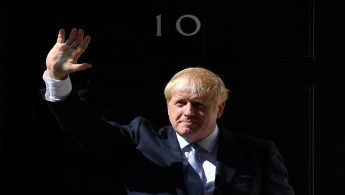Follow us on Facebook, Twitter and Instagram to stay connected
UK seeks tougher treason laws to prosecute Islamic State returnees
The British government is planning tougher restrictions on Islamic State group recruits returning from Syria and Iraq, and overturning Britain’s 650-year-old treason laws.
The reforms aim to increase the number of prosecutions of British citizens who return to the UK after travelling to join extremist groups.
Current laws, which have been in place since 1351, have been described by MPs as “unworkable” for prosecuting returning British IS recruits.
UK lawmakers will consult on adopting treason laws for the first time since they were used to prosecute Nazi sympathiser William Joyce in 1946, as part of a national security bill to be included in the Queen’s Speech on May 11.
Among the possible changes are what defines an “enemy” and widening “acts of betrayal” to cover membership or support of non-state actors who seek to harm the UK.
Reversing the burden of proof needed to prosecute a British citizen who has travelled overseas to join an extremist group will also be considered.
|
||
Individuals would also need a legitimate reason for travelling to a legally designated “hotspot” to which travel is banned, or face prosecution under British treason laws.
Read more: The Islamic State in Britain: Why young Muslims join and leave the extremist group
Tom Tugendhat, a Conservative MP who chairs the foreign affairs committee, lauded the proposals.
“We need tough sanctions for betrayal. We can’t wash our hands of those who spread terror abroad but can only deal with them if we’re willing to act and prosecute those who have betrayed our communities,” he said.
“It’s something that various countries have — a system that says it isn’t necessarily legal to travel to a particular country or region,” The Times quoted a Home Office source as saying. “It’s about demonstrating a good legitimate reason, and very few people are going to southern Iraq or Syria because of the weather in August.”
Another source said: “At the moment for people returning to the UK you need to prove they have done something bad. This bill will reverse that. Those returning will need to prove they weren’t doing something bad, otherwise they’ll face prosecution.”
The UK government, however, has been accused of neglecting its responsibilities towards British citizens who were trafficked by IS.
A report from the rights group Reprieve, which was released on Friday, found that the majority of British women and children detained in displacement camps in northeast Syria are trafficking victims, and said that the UK government has failed them.
The women, some who were as young as 12 when they were taken to Syria, were trafficked by IS and subjected to sexual and other forms of exploitation, the UK-based NGO's investigation found.
Reprieve accused the British government of "systematically failing" them through policies of blanket citizenship stripping, refusing repatriation and withholding basic consular assistance.
UK authorities have long grappled with how to handle the estimated 900 Britons who travelled to Syria and Iraq to join the conflict there.
UK authorities have long grappled with how to handle the estimated 900 Britons who travelled to Syria and Iraq to join the conflict there.
Although hundreds have returned to the UK - with dozens then prosecuted - the government has revoked more than 150 people's citizenship and an unconfirmed number remain in the hands of pro-Western Kurdish militias in northeast Syria.
Shamima Begum, who was just 15 when she and two other schoolgirls from London travelled to Syria to join the militants, is the most high-profile case.
She was stripped of her citizenship in 2019, and recently lost a long-running legal bid to return to appeal the decision.





 Follow the Middle East's top stories in English at The New Arab on Google News
Follow the Middle East's top stories in English at The New Arab on Google News


